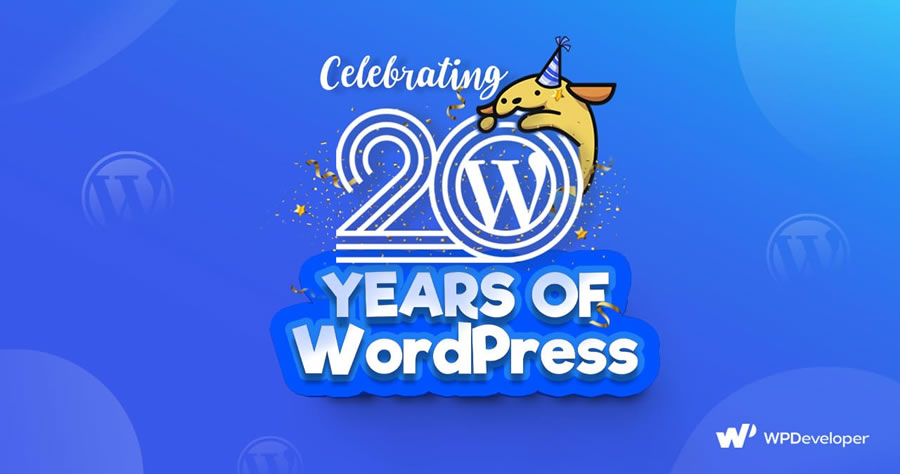WordPress, the iconic content management system, turns 20 this year, and it’s time to reflect on the incredible journey it has undertaken. From its humble origins as a personal publishing system, WordPress has grown to become the backbone of over 43% of all websites on the internet, with an impressive market share of 63.4%. Let’s take a moment to appreciate the evolution of WordPress and its profound impact on the world of web development.

The Birth of WordPress (2003) In 2003, two visionaries, Mike Little and Matt Mullenweg, created WordPress by forking the b2/cafelog CMS. Armed with determination and a desire for an elegant and well-designed publishing platform, they introduced WordPress to the world. It was a time when the internet was still finding its footing, and WordPress filled a crucial gap.
The Rise of WordPress (2005–2008) As WordPress matured, it rapidly gained popularity. In 2005, the release of WordPress version 1.5 marked a turning point, introducing themes and plugins. Suddenly, users could customize their websites without requiring coding knowledge. WordPress became accessible to everyone, empowering countless individuals and businesses to establish their online presence effortlessly.
In 2007, version 2.1 brought forth features such as autosave, spell check, and a built-in post revision system. These enhancements made content creation and management more streamlined, saving valuable time and effort. WordPress became a powerhouse, capturing the hearts of web developers and content creators worldwide.
The Gutenberg Era (2018-Present) The year 2018 witnessed a significant milestone in WordPress history with the release of version 5.0 and the introduction of the Gutenberg editor. Gutenberg revolutionized the way users interacted with WordPress, offering a block-based editor that eliminated the need for complex coding knowledge. Building visually stunning and functionally rich websites became as simple as dragging and dropping elements.
One tool that has further amplified the capabilities of WordPress is Elementor, a popular website and webpage builder plugin. With its user-friendly visual drag-and-drop editor, Elementor empowers web creators to construct sophisticated and dynamic webpages effortlessly. The WordPress ecosystem flourished with the combination of WordPress’s powerful infrastructure and Elementor’s intuitive design tools.
The Vibrant WordPress Community Behind every successful technology lies a thriving community, and the WordPress community stands out as one of the most vibrant and supportive in the world of web development. Comprising developers, designers, bloggers, scientists, and enthusiasts, this community consistently contributes to the growth and evolution of WordPress.

Regular meetups, WordCamps, and other events unite WordPress users, providing a platform to share knowledge, exchange ideas, and forge lifelong connections. The spirit of open-source collaboration and innovation that permeates this community has played a pivotal role in WordPress’s journey and continued success.
Celebrating 20 Years of WordPress To honor this monumental milestone, the WordPress community has come together to organize various events and initiatives. The Museum of Block Art (MOBA) has launched a dedicated page showcasing art created with Gutenberg, inviting submissions related to “20 Years of WordPress” art. The community has also curated a Spotify playlist featuring 46 songs to commemorate the 20 years of WordPress releases, further fostering a sense of celebration and togetherness.
As part of the celebrations, the project has released a set of special 20th-anniversary commemorative logos for everyone to enjoy and utilize. These logos encapsulate the remarkable journey and accomplishments of WordPress, reminding us of the profound impact it has had on the world of web development.
As WordPress turns 20, we celebrate the incredible transformation it has undergone. From its early days as a personal publishing system to its current status as the most popular CMS globally, WordPress has reshaped web development and inspired countless platforms along the way. The commitment of the WordPress community to open-source principles, collaboration, and innovation has been vital to this extraordinary success. Here’s to another 20 years of WordPress, where we eagerly anticipate the platform’s continued evolution and its impact on the digital landscape!

